- Home
- Thomas H. Cook
Elena Page 15
Elena Read online
Page 15
Howard shrugged. “If I said it, you can repeat it.”
“He said he sometimes felt that the basic thing had been reversed in him.”
“The basic thing?” Elena asked. “What do you mean?”
“Life,” Elizabeth said. “He thought it had been reversed in him. The process, I mean. So that he was really a ghost, only born out of turn, before it had a life.”
Howard smiled. “So now I’m a ghost who hasn’t died.”
I shook my head in despair. “Well, it certainly must be an interesting feeling, Howard.”
He nodded quickly. “It’s a handicap, though, being odd. Not really crazy, or anything like that. Certainly not dangerous. Just odd.”
“Yes, I suppose it is,” Elena said.
“It’s like being scarred or something,” Howard explained. “You know that people want to know about how you got cut or burned before they want to know anything else. Then, once it’s been explained to them, well, then they lose interest.” He took a sip of water, his eyes on Elena’s. “That’s why I always tell them first, like I did with Elizabeth, before I mentioned The Canterbury Tales.”
It seemed an appropriate time to change the subject. “How’s your father, Elizabeth?” I asked.
Her mood immediately darkened. “Not very well,” she said.
“He sleeps on the porch a lot,” Howard added. “I help Elizabeth get him back into the house sometimes.”
Elizabeth looked at Elena. “I don’t think he has much longer.”
“I’m sorry to hear that,” Elena said.
“Sometimes he gets a letter from an old war buddy or something,” Elizabeth said, “and he’ll go out on the porch with his whiskey and read it over and over until he passes out.”
“Then we bring him in the house,” Howard said. “We never drank in my family. Teetotalers, all of us.”
“Well, my father has been known to have a few,” I said.
“I was all for Prohibition,” Howard told me. “So was my family. I think my father gave some money to help push it.” He nodded sternly. “Good cause, I think.”
“Perhaps,” I said dully.
Howard slapped his hands together. “Have you seen any of Elizabeth’s new paintings?”
Elena looked surprised. “I didn’t know there were any old ones.”
“Well, I’ve been sketching a few things,” Elizabeth said modestly. “Nothing much.”
“Actually, they’re very good,” Howard said. “Especially the ones of the town bandstand and the front of the library.”
Elizabeth waved her hand in a dismissive way. “Howard is such a fan,” she said.
“Next time you come to New York, you should bring a few with you,” I told her. “Elena and I have some friends who might be interested.”
Elena looked at me quizzically.
“Harry,” I explained. “He’s interested in painting.” I turned back to Elizabeth. “Are you doing mostly sketches?”
“Anything, really,” Elizabeth said casually. And she quietly went on to tell us how Howard had coaxed her into what I believe she thought of as the beginning of a more creative life. She talked about her paintings, first describing them physically — the color and design of each canvas — then describing the mood she hoped to portray. There was a sameness in all of this, not of unoriginality, which in the end devolves into self-parody, but rather of a uniformity of vision, a sense of the world that was her own. Elizabeth saw the life of Standhope as something that shifted continually but remained unchanged, the fickleness of the human mood anchored by the clockwork of the seasons. That vision was more pleasant, perhaps, than mine, and certainly less severe than Elena’s became, but it remained distinct and comprehending.
“I guess I’ve come to love Standhope,” she said, as if in conclusion. “That must seem very silly to you, Elena.”
“No, it doesn’t,” Elena said. “It’s just a question of what you emphasize.”
Elizabeth looked puzzled. “What do you mean?”
I think it was the first time Elena had ever been asked a direct question concerning her own feelings about Standhope. She would answer it in New England Maid, of course, but on this day when such a book was beyond both her intent and her ability, she could only begin to address those matters which would so enflame the prose of her first book, giving to it, as one critic wrote, “a sense of lost amusement which darkens every page.”
“You don’t like Standhope at all?” Elizabeth asked.
“I feel as if it got in my way, Elizabeth,” Elena said. “It’s just something I feel. I don’t understand the implications of it.”
They talked on for a while, both of them reliving, as they had not had a chance to do in some time, the shared pleasures of their childhood. They talked of McCarthy Pond, of diving off the cliff above it, with me always diving last, as they said, “in the role of manly protector.” They talked of their schoolroom antics, and poor Mrs. Nichols was once again skewered by their wit. They seemed to delight in each other, and Howard and I sat enjoying them as well, though Howard repeatedly glanced apprehensively at his watch.
The reason for this was finally made plain, to my disappointment and, yet more pointedly, to Elena’s.
“I suppose we should think about getting a train now,” Howard said.
“A train?” Elena asked. She looked at Elizabeth. “I thought you were staying for the weekend.”
“Howard didn’t want to do that,” Elizabeth said.
Elena was not satisfied. “Why not, Howard?” she asked him.
“I like to be back in my house,” Howard said. “I don’t like New York for a whole day anymore.” He glanced at me helplessly, then turned back to Elena. “It’s one of the inconveniences of knowing me. Quirkiness. I’m working to get rid of it. But I decided on the trip down that I’d better not stay in the city for more than a few hours.”
“I see,” Elena said. She looked at Elizabeth. “Well, if you have to.”
“I do,” Elizabeth said.
Within an hour they were on the train headed back for Standhope and Elena and I were walking along together down Seventh Avenue.
“Well, he doesn’t seem so bad for all that craziness,” I said.
Elena did not look convinced. “You have to know what you’ll in dulge,” she said.
“Of course.”
“You have to be able to say, ‘All right, I’ll do this, but not that.”
“Yes, you do.”
“It’s like a voice in your mind,” she added.
I laughed. “Careful, you’re sounding a little cracked yourself.”
“A separate voice,” Elena added. “Like Dr. Stein has described Ariadne’s, full of guidance.”
“Well, maybe Elizabeth has a voice of her own.”
Elena nodded. “And maybe it’s telling her to stay in Standhope.”
“Maybe.”
We continued to stroll down Seventh Avenue, the Saturday evening bustle sweeping by us in all directions in carnival chaos.
I laughed. “I mean, when you compare it to this noise and frenzy, small-town life may not be so bad.”
“Perhaps,” Elena said.
“Especially for a painter,” I added. “I mean, Monet preferred Giverny, right? And Cézanne left Paris for Aix-en-Provence.”
Elena walked on silently, glancing randomly right and left as if trying to get hold of the city itself. “I couldn’t have stayed in Stand-hope,” she said after a minute. Her eyes filled with a sense of determination. “I always thought it was trying to make me disappear.”
I shook my head. “I don’t think so, Elena.”
“I do,” she said firmly. “And I was not going to let that happen.” She seemed certain that she’d made the right decision. Later, though perhaps only fleetingly, she would question the course that had led her from Standhope for good. “I would not become the shadow my hometown would have made me,” Dorothea Moore says in Inwardness, “and so, avoiding that, I became a stone.”
A few weeks after Elizabeth’s visit, Mother died in her sleep at Whitman House. The orderly who found her the next morning said that the bedclothes had been completely smooth. “She couldn’t have had pain, Mr. Franklin,” he assured my father as he stood in the portico of Whitman House the next afternoon, “because, you see, when they have pain, well, they just twist around and things get all tangled up.” Many years later, when an overly romantic essayist wrote that Elena Franklin’s mother had “died the death of Keats’s fond dream, ‘to cease upon the midnight with no pain,’” Elena responded in a terse note that “Keats’s fond dream had nothing to do with the death of a woman who had been slowly going mad for twenty years and of whose pain you can know nothing whatsoever.”
Miraculously, the director of Whitman House found my father at our house on Wilmot Street when he telephoned there on the morning of my mother’s death. Minutes after hearing the news, Father telephoned Elena in New York. Then Elena called me.
“William, I have some bad news,” she said, her voice noticeably strained. “Mother died this morning. We need to get back to Standhope today.”
An hour or so later, Elena and I met at Penn Station and boarded a train. She was very self-contained, completely controlled. From time to time I would attempt to engage her in conversation, but she always resisted, mumbling one-word answers to my questions. In Inwardness, when Dorothea’s mother asks her how she intends to deal with the grief she feels for her dead son, Dorothea replies, “I intend to think and think and think.”
That is probably what Elena did on the train that afternoon, refusing to be drawn into conversation, using a book only as a prop, something upon which she could hold her eyes to keep them from searching ceaselessly about the train. By the time we pulled into the station, she looked exhausted, yet somehow vibrantly alive, as if thought itself refreshed her.
Father met us at the train. He was wearing a trim black suit and black bow tie. He stood very erect, as if a huge weight had been lifted from his shoulders. That weight was, of course, my mother, as Elena was to make plain in New England Maid: “At the railway station my father looked as though he had regained his youth, the happy gait that was synonymous with his vitality, a freedom that was but newly his — the carefree consequence of a woman’s death.” That my father was able to reconcile himself to Elena after he read that line was one of the minor miracles of his small life.
“I’m glad I was here in Standhope when the news came about your mother,” he said to us as we stepped off the train. There was a hint of liquor about him, or perhaps cheap perfume.
I shook my father’s outstretched hand. “What happened exactly?”
“You mean cause of death, Billy? Well, nobody seems to know. She just died in her sleep, that’s all.” He moved away from me and embraced Elena. “Just died in her sleep, Princess.”
Elena looked at him steadily. “Where is she?”
My father seemed puzzled. “You mean the body?”
“Yes.”
“Still at the asylum.”
“I want to see her,” Elena said firmly.
“The body’s not ready yet,” my father said. He gave me a helpless look, then turned back to Elena. “It’s got to go to the funeral parlor.”
“I want to see her before then,” Elena said.
“They won’t let us do that, will they, Princess?”
Elena smiled thinly. “How can they stop us?”
A few minutes later, we were standing before Whitman House as my father struggled to explain to its director that his daughter wanted to see her mother’s body before any further preparations had been done.
The director listened patiently, then spoke to Elena. “This is normally done after embalming, you understand.”
“Yes, I do,” Elena said.
With that, the director ushered Elena and me into the building and down a flight of stairs to the basement. My father had decided not to accompany us.
“This is not the most graceful way to view a body, I’m afraid,” the director said as he switched on the light and pointed to a metal table. “Mrs. Franklin is under that sheet,” he said. “I’ll leave you alone for a few minutes, of course.”
The room was very musty, but it was cool. There was a battered sink in the corner and a jungle of piping overhead. Metal shelves lined the far wall, stacked with assorted supplies — trays and light bulbs, rolls of toilet tissue.
Elena walked quietly to the table and turned back to me. “Do you want to see her?”
I shook my head. “Not really, Elena. Why do you want to?”
Elena did not reply. She drew the sheet from our mother’s face and looked at her. In New England Maid, she described what she saw: “My mother was resting on her back, her face pointing directly toward the ceiling. Her eyes were closed, but her lower lip drooped slightly downward, so that the tips of her bottom teeth were visible. The light fell across her face from the left, throwing the right side into shadow. There were deep creases beneath her eyes and two vertical ones on either side of her face. Her skin looked parched and leathery, as if already fossilized, but unconsciously enduring, joined at last to earth.”
Elena drew the sheet back over our mother’s face. “All right,” she said, “we can go now.”
The two of us walked quickly up the stairs and out of the asylum. My father was standing casually in front of his Whippet 4, looking for all the world like a cab driver waiting for a fare.
Once we had returned to the house on Wilmot Street, he informed Elena and me of the funeral plans he’d already made. They were spare, to say the least.
“I’m not having any visiting hours at the house, either,” he said in conclusion. “I don’t want all the neighbors trailing through here staring at me. I know what they think. Believe me, I know.”
Determining what my father did or did not know of this world might have occupied the lifetime of more than one researcher. But as the evening progressed and he drew deeper into the whiskey, he hinted of certain disappointments. While Elena read quietly in her chair by the window, he spoke to me of dingy hotel rooms, bad investments, missed chances. It was the litany of a little man, the droning complaint of a tiny soul, and after a time even Elena could stand no more of it.
“Perhaps you should get some sleep,” she said, cutting him off.
My father glanced up. “What’s that?”
“I said you should get some sleep. There’s a lot to do tomorrow.”
Father nodded slowly. “Putting your mother in the ground.”
Elena closed her book. “Go to bed, Father.”
He struggled to his feet, his head weaving right and left. “Didn’t mean to get sloshed, Elena. Not nice, what with the funeral. You’ll forgive my bad manners, please.”
“Go to bed,” Elena repeated.
He obeyed immediately, with a groggy nod to me, and passed down the hall, propping himself against the wall. He closed the door softly behind him.
“He’s sleeping in her room,” I said. “Been a long time since he’s slept in there.”
Elena returned to her book.
“I’ll never understand the power you have over him,” I said, “the way he obeys you.”
Elena did not look up. “We understand each other,” she said crisply.
The next afternoon, under the weepy auspices of a slight drizzle and to the muttered incantations of a young Congregational minister who had never met her, my mother was buried in Standhope’s town cemetery. Elizabeth and Howard were there, standing respectfully at Elena’s side, my father and I across from them. The minister was beginning his brief commentary on my mother’s life, when Mr. Brennan came trudging up the hill, hat already in his hand, the wind tugging at his enormously baggy pants.
“Sorry I’m late, boy,” he hissed into my ear. He seemed thinner than I remembered, but his eyes remained red rimmed and glistening so that he looked, as he always did, either on the verge of a seizure of weeping or as if he had just completed one.
After the funeral, we all made our way down the hillside. At the bottom, Mr. Brennan rushed over to Elena, embraced her, muttered, “Sorry, so sorry,” then rushed away.
“He’s got to get back to the drink,” Elizabeth explained apologetically to my father.
“Oh well, I can certainly understand that,” my father replied.
The rest of us went back to Wilmot Street, where we sat gloomily at the dining room table. Elena made coffee and my father produced some sort of cake to go with it. After a while Elizabeth and Howard excused themselves.
“I loved your mother,” Elizabeth said as she embraced Elena at the door, “I really did.”
Elena smiled faintly. “I’ll write when I get back to New York.”
Elena disappeared not long after Elizabeth and Howard left our house. She simply eased out and left me sitting in the living room watching father snooze.
At first I thought she had merely gone for a short stroll, but as the hours passed it became clear that she had done a good deal more than that. At a certain point, my imagination got the better of me and I began to construct lurid notions of what might have happened to her.
“I’m going out to look for Elena,” I told my father.
He had roused himself just a minute before. “Where?”
“I don’t know.”
“She just wants to be alone, Billy,” my father said. “She’s got that in her blood. I’ve known that since she was a child.”
“It’ll be night soon.”
My father smiled. “She can walk in the dark.”
I shook my head. “No. I’m going after her.”
Evening had already begun to fall by the time I found her. I had gone to the town square, now so much more brightly lit and bustling than it had been in my boyhood. I peeped in at Thompson’s Drugstore and saw old man Thompson himself, ancient as ever behind the counter, shakily moving mortar and pestle. I passed through the park, edging near that bandstand where Wilson had spoken so firmly in his Presbyterian black suit. Then it struck me where she was, and I found her there, sitting on the bench across from Whitman House.

 The Interrogation
The Interrogation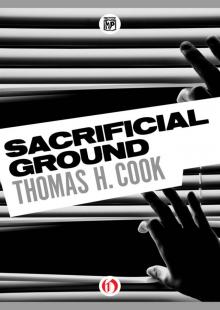 Sacrificial Ground
Sacrificial Ground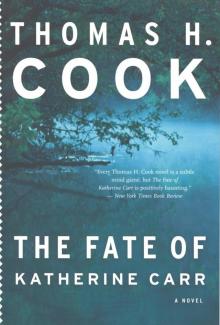 The Fate of Katherine Carr
The Fate of Katherine Carr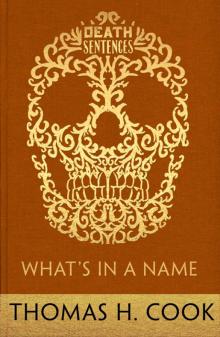 What's In A Name
What's In A Name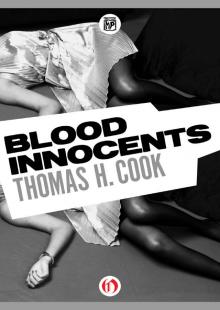 Blood Innocents
Blood Innocents Peril
Peril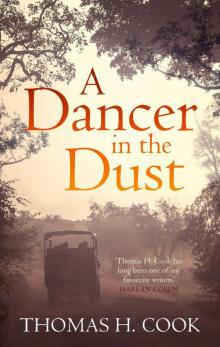 A Dancer In the Dust
A Dancer In the Dust Breakheart Hill
Breakheart Hill The Chatham School Affair
The Chatham School Affair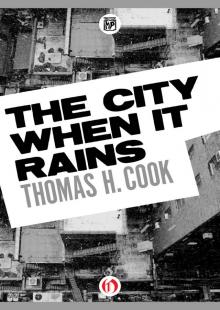 The City When It Rains
The City When It Rains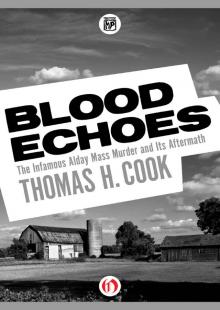 Blood Echoes
Blood Echoes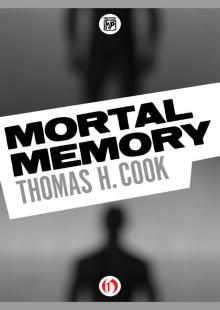 Mortal Memory
Mortal Memory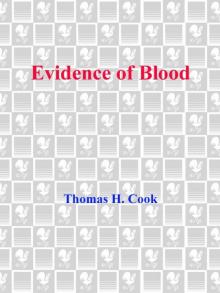 Evidence of Blood
Evidence of Blood Into the Web
Into the Web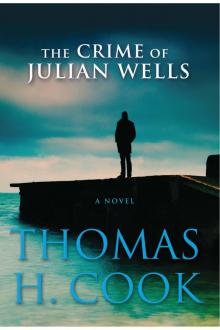 The Crime of Julian Wells
The Crime of Julian Wells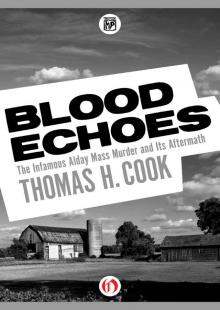 Blood Echoes: The Infamous Alday Mass Murder and Its Aftermath
Blood Echoes: The Infamous Alday Mass Murder and Its Aftermath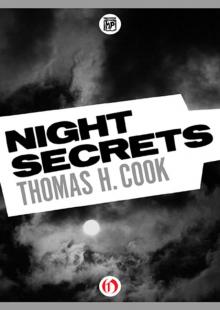 Night Secrets
Night Secrets Places in the Dark
Places in the Dark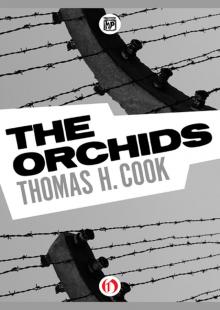 The Orchids
The Orchids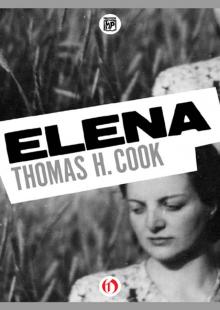 Elena
Elena Streets of Fire
Streets of Fire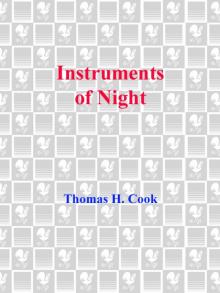 Instruments of Night
Instruments of Night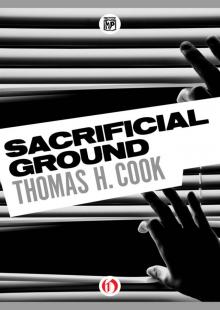 Sacrificial Ground fc-1
Sacrificial Ground fc-1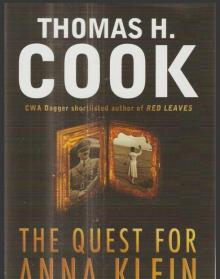 The Quest for Anna Klein
The Quest for Anna Klein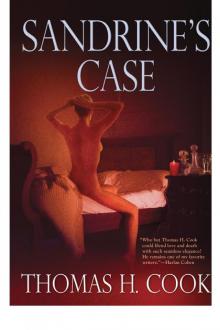 Sandrine's Case
Sandrine's Case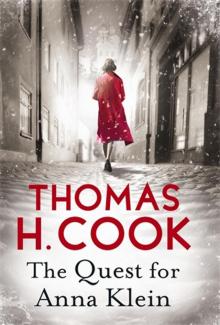 Quest for Anna Klein, The
Quest for Anna Klein, The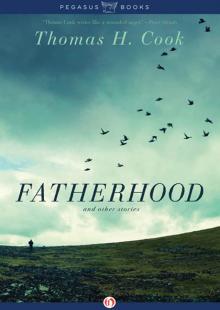 Fatherhood
Fatherhood Flesh and Blood
Flesh and Blood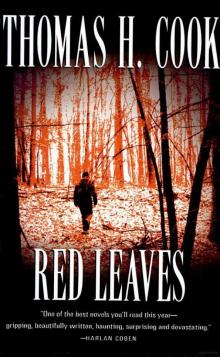 Red Leaves
Red Leaves